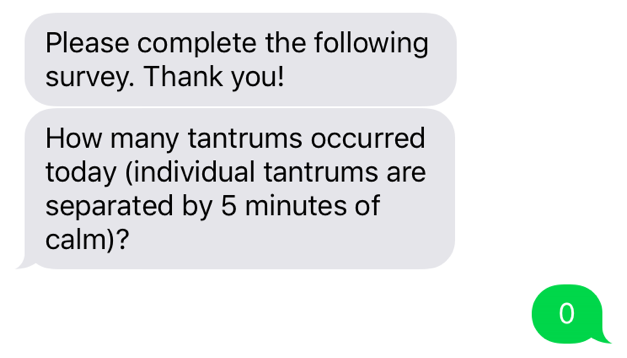Summer Archives
Abby MorganNashville, TN - Behavior Analysis Clinic (BAC) |
 Just after 8pm on May 11th, I nervously opened my Internet browser, quickly logged into REDCap and clicked on my project’s Record Status page. I was filled with anticipation during the moments it took to load. Then, four columns of checkmarks appeared. In that moment, I felt like those checkmarks were the most beautiful thing. I’d spent the months preparing for my summer project by testing and retesting REDCap’s text message survey system. Finally, I’d been able to send out text messages to parents. But this was only the beginning. After seeing that the checkmarks were there, my next step was to click on one and see the high levels of challenging behavior from the children I’d be working with this summer. For me and the other Behavior Analysis Clinic interns, the work was really just beginning.
Just after 8pm on May 11th, I nervously opened my Internet browser, quickly logged into REDCap and clicked on my project’s Record Status page. I was filled with anticipation during the moments it took to load. Then, four columns of checkmarks appeared. In that moment, I felt like those checkmarks were the most beautiful thing. I’d spent the months preparing for my summer project by testing and retesting REDCap’s text message survey system. Finally, I’d been able to send out text messages to parents. But this was only the beginning. After seeing that the checkmarks were there, my next step was to click on one and see the high levels of challenging behavior from the children I’d be working with this summer. For me and the other Behavior Analysis Clinic interns, the work was really just beginning.
The Behavior Analysis Clinic (BAC) serves children and young adults with a history of severe challenging behavior (physical and verbal aggression, self-injury) that has been resistant to other interventions. The BAC splits graduate student interns into teams, each with one client. Each teams’ goal is to significantly reduce problem behavior over the course of one semester by teaching clients appropriate ways to express their needs and have them met. For this to work, teams also have to teach families to respond to their child’s behavior in different ways. We began therapy in our clinic room and eventually transitioned to helping parents practice in their homes and, for some cases, training personnel in schools. This transition from the clinic to the home or school is called “generalization;” it requires parents and kids to generalize the skills they have learned in the clinic to more settings. Generalization is incredibly important. Whether the behavioral skills work at home or school matters much more than whether they work in the clinic. Because the text messaging system I created would show behavior outside of the clinic throughout our time with families, it would tell us when generalization was happening. Our hope was to catch when an intervention was not working at home early enough to problem solve.
Fast forward from May to early August. The case managers, Dr. Lambert and I are sitting in our Peabody Library meeting room. Dr. Lambert is reviewing the outcomes we are seeing with text message data. Only one family seems to be using their new skills at home and seeing decreased challenging behavior. The other families have seen little to no decrease. When interns implemented interventions, they prevented problem behavior. Dr. Lambert suspected that positive behavioral skills typically generalized to parents and homes only after interns trained parents in their homes or not at all, but he had never had a means to document this. My text messaging system successfully allowed him to do so. Unfortunately, this summer’s outcomes were disappointing and revealed potential flaws in the BAC’s services. First, it is incredibly difficult for parents and children to transfer skills from the clinic to homes or schools. Second, the BAC has a time limit on the services it provides, which does not always align with the amount of time families need. I hope that my project allows the BAC to make better use of the time it has to walk alongside families as they try to make difficult changes to improve their children’s lives.
For more, please visit the Behavior Analysis Clinic at the Vanderbilt Kennedy Center.
